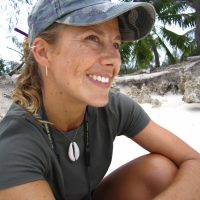Tessa grew up on a farm in the savannas and escarpment forests of South Africa, an environment that instilled in her a passion for ecology from a young age. After a year in Tasmania as a Rotary Scholar, she began her undergraduate studies via correspondence with the University of South Africa (UNISA) while travelling and working in SCUBA diving. In 2003 she returned to South Africa to complete her BSc. in Botany and Zoology at the University of Cape Town (UCT), followed by a BSc. Hons in Zoology, a field course in the Kruger National Park with the Organisation for Tropical Studies (OTS) and a MSc. in Conservation Biology from the same university. Her study subjects ranged from the impacts of elephants on savanna vegetation and bat community ecology to upwelling system dynamics, crinoid symbionts and the effects of dynamite fishing on coral reefs in Tanzania. Since graduating she has worked as a conservation manager for the Sustainable Seas Trust (SST), sailed the South American coast, volunteered as a researcher on the Aldabra Atoll World Heritage Site in the Seychelles and managed diving and marine logistics on Vamizi Island in the Quirimbas Archipelago of Mozambique, before deciding it was time to fulfill a lifetime aspiration of pursuing a PhD in coral reef ecology at James Cook University. The focus of her current research is on how the trophic ecology of coral reef ecosystems is affected by habitat degradation, with a particular interest in the implications for predators associated with the reefs. Through sharing her research findings via not only academic publications, but also teaching, tourism and media, Tessa hopes to inspire others with her passion for the marine environment.











 Researchers
Researchers Students
Students Alumni
Alumni Management
Management






